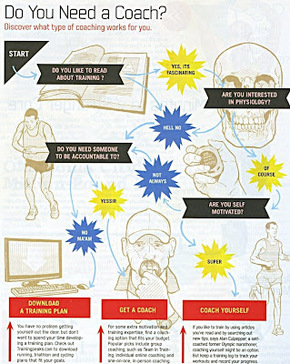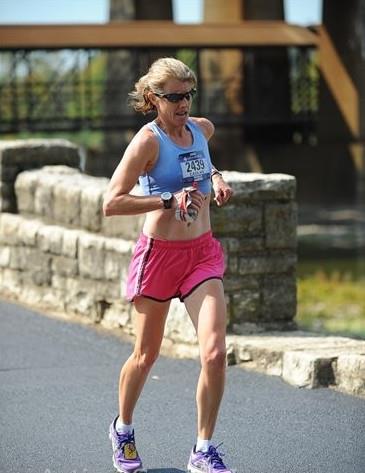“If you want to become the best runner you can be, start now. Don’t spend the rest of your life wondering if you can do it.” - Priscialla Welch, Olympian & NYC Marathon winner When I was in my 20s I saw myself as a fairly serious runner and road racer. Back then I usually placed in the top 3 of most of the regional races I entered, and I had big dreams - I ran sub-40 for 10k. By golly, that meant something (to me). But it never would have occurred to me to get a coach. I worked briefly with Andy Palmer in Maine, but for the most part I believed that coaching was only for the really really good runners and I never felt worthy. That was the 1980s and things have changed since then. Today all kinds of runners turn to coaches to help them for a variety of reasons and I, for one, see this as a good change. But of course I feel this way, suspicious readers might say while rolling their eyes at the transparent self-interest obviously at work here. After all, I'm now a coach, RRCA Certified (http://www.rrca.org/coaches/) and soon to be Lydiard Foundation (http://lydiardfoundation.org/) coach certified. Clearly I'm just trying to tell you all to train with me, give me gobs and gobs of money - make me rich and famous...Sorry, but that's not my purpose here. My purpose, instead, is to discuss the reasons why coaching may or may not enrich your running life, and to suggest that we each have own own answer to these two questions: Do I REALLY need a coach? and if so, What type of coaching (individual, in-person/online, running group, etc) would be best for me? There's lots and lots of running advice out there - books, videos, online training sites, Facebook running groups of all varieties, discussion boards, free training plans offered by everyone and anyone, and of course blogs, blogs...and so many more blogs. Some of the advice it good, and some, not so good. The challenge is sifting through it all and separating the wheat from the chaff. Let's face it, there's a lot we still don't know about pretty much everything in life.We know how to measure gravity, but do we really understand WHAT it is? And why is there something, rather than nothing? Where did everything come from? Where and how did everything begin? And we believe we know when we're dreaming or awake, but do we really KNOW the difference? Can I really PROVE I'm awake right now?... Sorry. Too much philosophy. Back to running... Knowledge is forever evolving as new understanding, evidence, and experience come to light. It's no different for running and training principles. What's best???: Barefoot or shod? Hard/easy or hard/hard/easy, or easy/easy/hard...? Run more or run less? How should I fuel before/during/after a long run/race? Am I drinking too much or too little? Electrolytes or no electrolytes? Trust my thirst or not? What shoes will fix X, Y, and Z-condition (fill in your injuries)? How long should a long run be? How long should I taper? What happens if I miss some runs? Then there's: Long runs (LSD) - How long and how slow? Intervals - How long and how fast and how many? Tempo runs: 5k pace, 10k pace, 15k-1/2 marathon pace...and for how long? Blahblahblah.. Marathon pace runs...progression runs...recovery runs...short hills...long hills...crosstraining...Ugg But we're not done yet. Now let's add in form: cadence, lean, arm swing, foot plant, push off...OMG! Make it stop. Here's a typical question directed to other runners: "Can anyone recommend a good 1/2 marathon (or marathon, etc) training program? I run about 15 miles per week and have run some 5k's and 10Ks." Some say to all this: JFR (Just F$%&ing Run!). It's as simple as that. And it may be. The self-coached runner, who has high aspirations and/or is taking on a new challenge, or the newer runner who doesn't have any experience with running, must have a pretty insatiable appetite for and curiosity about the ever changing information out there concerning training, nutrition, recovery, biomechanics, injury rehab...OR they can just download a program from one of the many well regarded and successfully used training plans, hope for the best and place their trust in what seems to work for so many others. And that will probably work for you if you are self motivated - driven - disciplined... There's literally gobs of decent cookie-cutter programs out there. Try one that sounds good. It will probably get you to the finish line, and you may learn a thing or two along the way. The question is: Is what you're doing working for you? And this question is important whether you are self-coached or if you currently have a coach. Are you happy with how you're progressing? Have you plateaued? Are you feeling confused about how and what to change in your training? Do you have zero interest in trying to understand everything and you just want to run or do you love reading books, and articles about training? Do you need (or does it help) to be accountable to someone else? Do you need/want others to run with? All these questions are very personal, and they will determine whether a coach, and what sort of coach, might work best for you. One thing's for sure: It's no longer just elites, or aspiring elites, looking for good coaching that suits their individual needs to help them reach their personal goals no matter what those goals may be. "For me, running is a lifestyle and an art. I’m far more interested in the magic of it than the mechanics.” ~ Lorraine Moller, Olympic Marathoner and Bronze Medalist.
0 Comments
"What you get by achieving your goals is not as important as what you become by achieving your goals." - Henry David Thoreau" Act as if what you do makes a difference. It does." - William James Last month I lost my running mojo.
I don't know where it went. Perhaps it got knocked out of me when I was pounded to the ground at the climbing gym, left concussed and confused. Perhaps it was the nefarious flu bug who carried it off to some other poor soul. Perhaps it was all the busy-ness I've been feeling that suffocated the oomph out of my spirit - but something happened. Or perhaps it began much earlier, back in November, 2011, during a race in 80+ mph winds. Perhaps my mojo blew off to Kansas like so much tumbleweed and I began to notice the annoying ache in my foot. Was this the foreshadowing of dark days to come? Whatever the cause, and whenever it happened, I slipped into a slump. It wasn't the first time and, no doubt, it won't be the last time. Runners experience these up-and-downs because, well, we're just human beings. We experience these in life, why expect anything different in our running-life. What's important is to be mindful that this too shall pass. Slumps happen, and often times at what seems like the worst possible moment - like, just when you're feeling strong and on top of it all, ready for a breakthrough - and then, bang, slumpsville, or worse injury, or worst of all, both. Well injuries are one thing, but slumps seem so unnecessary, so seemingly stupid. Can't we all just keep pushing and improving and pushing and improving until the bitter end? Well...no. No, most of us can't - or at least we won't. So what's a slumping runner to do? Some recommend a break, and that may be called for depending on the situation (for instance if you are experiencing overwhelming fatigue). But a break is not always the answer. Sometimes it behooves us to push on, doggedly, even through the hard, tedious, unmotivated runs that we drag ourselves through. I believe that you have to be out there on the good days and the bad days, and the really really sucky days, to capture, to stumble upon, those magical days that you might otherwise miss. Sometimes a change happens, for no apparent reason, when you're least expecting it - and you would never know if you weren't out there. Being a runner is not all about loving it every single moment - just like a good marriage, or friendship - it's not all good all the time. If those are your expectations, you're in for a big let down, and you'll probably give up when perhaps you don't really want to. There's gobs of advice and suggestions for upping one's motivation: Sign up for a race, join a running group, explore new routes, get a partner, plan an exotic running vacation, etc...But the fact remains that for most of us we must find our own reasons for going on, getting out and doing it - and these suggestions may work for a while, but it's unlikely they'll get you through a real, robust case of slumpiness. For me it is pure habit that gets me through it. Habit takes a long time to develop, and if you quit every time you hit a rough patch, then you won't develop the habit to keep running, to just do it every day. Instead, you will develop the habit of quitting when you just don't feel like doing it - and that's okay, if that's what you're after. It's not what I'm after, and I believe it's not what most runners are after. If it were we wouldn't complain about slumps - we would welcome them into our lives like an old friend, use the time to do something else, and then pick it up again when the mood strikes. But no. Most runners hate the slump. "You can't wait for inspiration. You have to go after it with a club." - Jack London Running is not a state of being - it's a state of doing. You are what you do, and you must accept the ups and the downs. And though the ups are a whole lot more fun than the downs, they are all part of the journey. If it were easy it wouldn't matter so much. If it does matter, then that means you're a runner - and you should just go for a run. *********************** And so, sunk deep in slumpsville, I head out for a 22 mile run. All my long runs thus far, during this training cycle, have been painful tests of perseverance, and so I venture off with a nagging feeling of fear and dread. But surprise, surprise. As I trot along a dirt road, who should I run into but my mojo. Before I know it she has attached herself to the soles of my feet like Peter Pan's shadow. I can fly... |
Chronic Runner
|



 RSS Feed
RSS Feed
